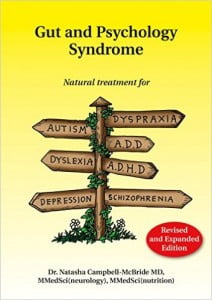
First, if you're just looking for some GAPS links, here you go:
- A refresher on the GAPS Diet and who is Dr. Natasha Campbell-McBride
- Click here for the GAPS Diet book by Natasha Campbell -McBride
- Click here for the strong probiotics
- Click here for the cod liver oil
- Click here for Grain free meal plans
- Click here for a GAPS Starter Kit
“So all these factors together created generations of women with seriously abnormal gut flora, and that's what they pass to their newborn babies nowadays, and as a result we have epidemics of learning disabilities and physical problems in our children.”
 So says Dr. Natasha Campbell-McBride, author of the GAPS Diet, in the video below. (GAPS stands for Gut and Psychology Syndrome.) She explains the factors that can damage our gut flora, which translates like this for the normal person: things that do a number on our immune system, which resides in our intestinal tract. I've been talking about this a lot lately, because it can make all the difference in someone's health. Those who have a gut full of enough healthy bacteria just don't get sick. They feel good. They have good energy and attention spans.
So says Dr. Natasha Campbell-McBride, author of the GAPS Diet, in the video below. (GAPS stands for Gut and Psychology Syndrome.) She explains the factors that can damage our gut flora, which translates like this for the normal person: things that do a number on our immune system, which resides in our intestinal tract. I've been talking about this a lot lately, because it can make all the difference in someone's health. Those who have a gut full of enough healthy bacteria just don't get sick. They feel good. They have good energy and attention spans.
Watch the video below for more, but here are some excerpts on what can damage your gut flora:
- Antibiotics
“As soon as antibiotics were discovered, the damage to a large percent of the population began.”
- Bottle feeding
“Breast feeding is essential for a baby to develop normal gut flora.”
- Prescription medication given on a long-term basis, such as the birth control pill
“The effect of contraceptive pills on the composition of bacteria in the gut is devastating. The longer the lady is on the contraceptive pill, the deeper will be the damage on her gut flora.”
- Junk food, other processed foods, especially processed carbohydrates
“Processed foods feed, almost exclusively, abnormal species of microbes in the digestive tract, they do not feed the beneficial bacteria.”
- Exposure to large amounts of various toxic substances at work or elsewhere. Such as radiation or alcoholism.
“Whatever toxins we humans have created, if we are exposed to large amounts it will have an effect on gut flora.”
What to do?
For some, they need to go full-out on the GAPS Diet in order to heal from serious health issues, and this includes taking strong probiotics to fill their gut with a LOT of healthy bacteria – the “big guns”, as I call them. But they’re expensive. For others, they may need only to get rid of processed foods and eat more Real Food, especially fermented foods which can economically fill your gut with healthy bacteria.
I know how to make a few fermented foods like yogurt, fermented vegetables, fermented beverages like kefir soda pop or fermented lemonade punch, but there are so many more foods that can be fermented.
Watch the video with Dr. Natasha Campbell-McBride:


Terri says
Not to mention colonoscopy! I had one the other day. the prep is BRUTAL! I don’t really know how to recover from it.
KitchenKop says
Lost all my comments from yesterday after a bad website glitch, here’s one that I’m re-posting…
From hellaD:
Great post, the GAPS diet is incredibly helpful and I think there are more of us out there who need it than we realise! We have been on it for a year and it has changed our lives. My partner no longer has allergies and I have stopped getting migraines that devolved into cyclical vomiting syndrome. I have much more energy than I have had since contracting typhoid years ago. I have also discovered that my problems with RSI and carpal tunnel syndrome have nearly vanished. Which I believe is because my gut now has plenty of friendly flora that are producing heaps of the B vitamins which is what our nerves are really starving for. This diet has absolutely changed my life in miraculous ways. It is really tough to do, especially at the beginning, but absolutely worth it.
Amanda Y. says
I would love LOVE LOVE to hear and know more about the effects of the birth control pill on digestive health. Aside from never ever wanting children, I currently am on the pill because when I’m off it, I get very painful ovarian cysts (that seem to be genetic), so I will likely not go off the pill, but want to know more.
KitchenKop says
I know Dr. Natasha Campbell-McBride has spoken about this a lot before, so you might try googling her name along with “contraceptive pill” or “birth control pill” and see what you find.
Kelly